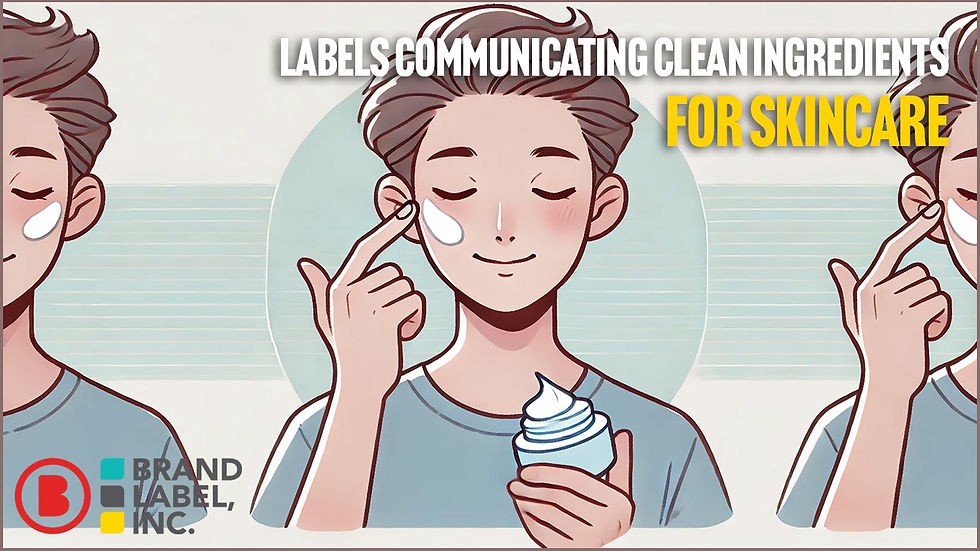The Role of Labels in Communicating Clean Ingredients for Skincare Products
- Barrett Matlock

- Nov 6, 2024
- 2 min read

With a growing emphasis on clean beauty, skincare brands are under increasing pressure to provide transparent information about their ingredients. For consumers, labels have become an essential tool in evaluating the safety, ethics, and environmental impact of their skincare products. Let’s explore the critical role labels play in communicating clean ingredients and fostering trust in the beauty industry.
Building Trust through Ingredient Transparency
The foundation of consumer trust lies in transparency. Skincare labels should provide a clear and accurate list of ingredients, especially as more consumers scrutinize products for harsh chemicals or synthetic compounds. When brands openly disclose every ingredient, consumers feel empowered to make informed decisions that align with their personal health and values. Labeling practices that emphasize “free from” statements, such as “free from parabens” or “no artificial fragrances,” are also effective in demonstrating a brand’s commitment to clean beauty.
Certifications and Seals: Endorsements of Purity
Certifications are a powerful tool for communicating clean ingredients. Labels with seals from third-party organizations like the Environmental Working Group (EWG), USDA Organic, and COSMOS assure consumers that the product meets strict standards. These seals serve as instant credibility boosters, especially for those who seek cruelty-free, vegan, or sustainably sourced skincare options. Highlighting certifications on the label builds trust and positions a brand as dedicated to ethical, clean skincare.
Simplifying Ingredient Names for Accessibility
Labels that use consumer-friendly language instead of complex chemical names can help customers feel confident in their choices. For example, listing “Vitamin E” rather than its scientific name, “tocopherol,” helps consumers instantly recognize beneficial ingredients. An ingredient glossary on the label or in online product descriptions can further educate consumers on ingredient sources and their skin benefits, enhancing the brand’s transparency and commitment to clean beauty.
Emphasizing Plant-Based and Natural Ingredients
Consumers often look for natural and plant-based ingredients in clean skincare products. Labels that highlight terms like “derived from plants,” “botanical extracts,” or “natural oils” resonate with shoppers seeking products with minimal synthetic additives. Additionally, labels that specify the percentage of natural or organic ingredients allow consumers to gauge how closely a product aligns with their preference for clean, eco-conscious beauty.
Highlighting Sustainability and Environmental Responsibility
Clean beauty often goes hand-in-hand with sustainability. Labels that specify eco-friendly practices, such as recyclable packaging or ethically sourced ingredients, align with consumers’ values around environmental responsibility. Statements like “packaged in recycled materials” or “sustainably sourced ingredients” allow brands to differentiate themselves while communicating their commitment to a holistic clean beauty approach that goes beyond ingredients.
Differentiating from Greenwashing
In an era of greenwashing, where some brands make misleading claims about being “natural” or “eco-friendly,” clear, honest labels set genuine clean brands apart. Rather than vague terms like “pure” or “green,” a trustworthy label provides precise details about what makes the product “clean.” Avoiding buzzwords and instead listing specific claims builds credibility and reassures consumers that the brand practices authenticity in its labeling.
In the skincare industry, labels are more than a regulatory necessity—they are an invaluable means of communication between brands and consumers. With a focus on transparency, certifications, ingredient accessibility, and sustainability, skincare labels help consumers navigate the complex world of clean beauty. Brands that prioritize these elements on their labels not only build trust but also encourage loyalty among consumers who value ethical, clean skincare choices.




Comments